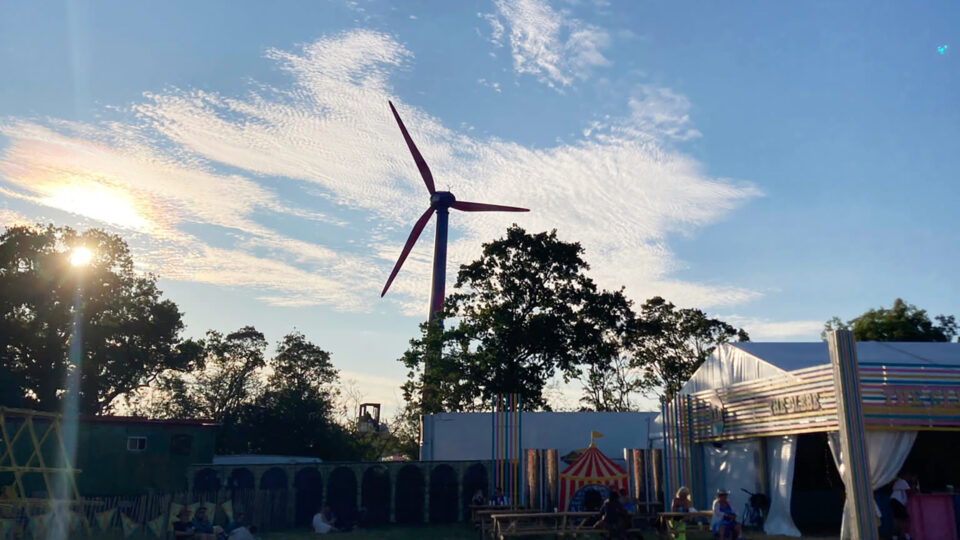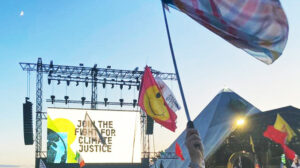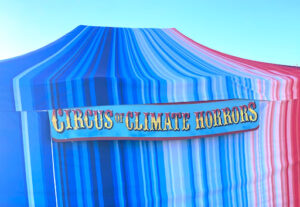- Posted on June 28th, 2023
Like a Turbine in the Wind: Sustainability at Glastonbury and Beyond

Glastonbury’s sustainability efforts hit the headlines several times this year with everything from installing a wind turbine, to sustainable transport options, and banning the sale of disposable vapes.
Fresh from the Festival’s fields, our music sustainability specialist Richard Phillips shares insights from how Glasto and the wider outdoor events sector are reducing their environmental impact.

Sustainability at this year’s Glastonbury Festival
As Elton John sang his famous ode to Marilyn Monroe on the Pyramid Stage, something else was blowing in the wind. Standing at 28 metres tall and dressed in festival colours of purple and pink, Glastonbury had a new landmark this year: a wind turbine, installed by Octopus Energy. Together with solar panels and batteries, it provided up to 300kWh of electricity per day – enough to help power the many surrounding food stalls entirely with clean energy.
In fact, this year saw all Glastonbury’s power needs met with renewable energy and renewable fuels for the first time – an impressive feat, especially when you consider it is technically the fourth-largest city in South West England for the weekend.

Striking as the turbine is, it is not the only noticeable touchpoint with sustainability for the 200,000 plus festival-goers. Environmental messaging has been a core part of Glastonbury since the very beginning, but these themes are increasingly featuring in all manner of performances.
Take, for example, the Circus of Climate Horrors or the immersive engagement with audiences by grassroots environmental charity Take the Jump, which roamed the site.
On-screen messages calling for climate justice before headline acts held particular power – so too the communication directly from artists themselves (a fun example coming from other-worldly concept band Henge sharing their interplanetary message for humans to ‘get a wriggle on’ with climate action).


These sorts of creative climate interventions at festivals can have a huge impact. At Julie’s Bicycle (JB) we believe that culture is critical to the response to the climate crisis. When artists and cultural events use their platform to speak out, it can inspire change among a vast audience – in this case an audience the size of a small city, not to mention those watching televised performances at home.
Beyond energy and programming, Glastonbury has continued its commitment to tackling waste, banning the sale of disposable vapes and avoiding single-use plastic bottles, which were banned in 2019 (single-use plastic cups, serveware and sachets have been banned a lot longer). As usual, festival-goers were well-catered for with sustainable options of travel too, with many long-standing services, such as free train station shuttle buses and extra trains. JB has recently published a report looking at how events can engage live music audiences on travel, which you can read here.
What else is going on in the wider festival scene?
On the final day of the festival Hope Solutions brought together sustainability professionals from across a number of sectors. With dedicated and inspirational individuals from festivals large and small attending, the meetup brought home just how much is going on to improve the environmental impact of live events.
JB has been proud to have partnered on many initiatives across the live events sector. Together with a range of festival and sustainability specialists across Europe, the recently launched Future Festival Tools has provided free sustainability training resources for festival and events professionals. The tools are designed to support all festivals in improving their environmental impacts, regardless of the current level of performance or size.
Tackling the issue of festival waste head-on, a collaboration between JB, sustainable outdoor events network Vision:2025 and waste consultancy Resource Futures, published a report exploring how common barriers can be overcome towards achieving zero waste at festivals. The next phase of this work is a collective effort from festivals to capture more waste data this year, which many are signing up to through an open call to participate.
JB is also working closely with Vision:2025 on the development of a Green Events Code of Practice, setting minimum standards and targets around sustainability to be adopted by all stakeholders across the outdoor festival and events industry, including event organisers, local authorities and suppliers.
Elton may have been singing about a candle in the wind, but sustainability measures at festivals continue to shine brightly.
